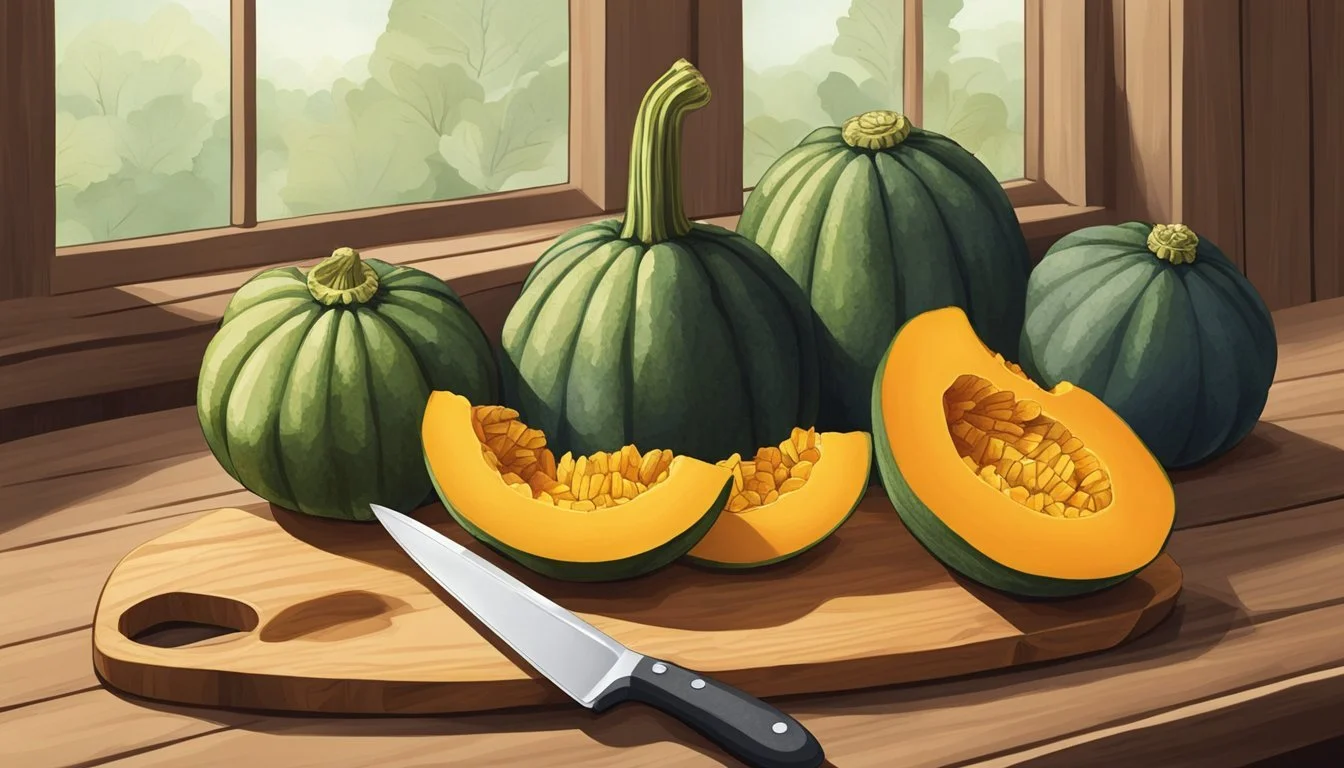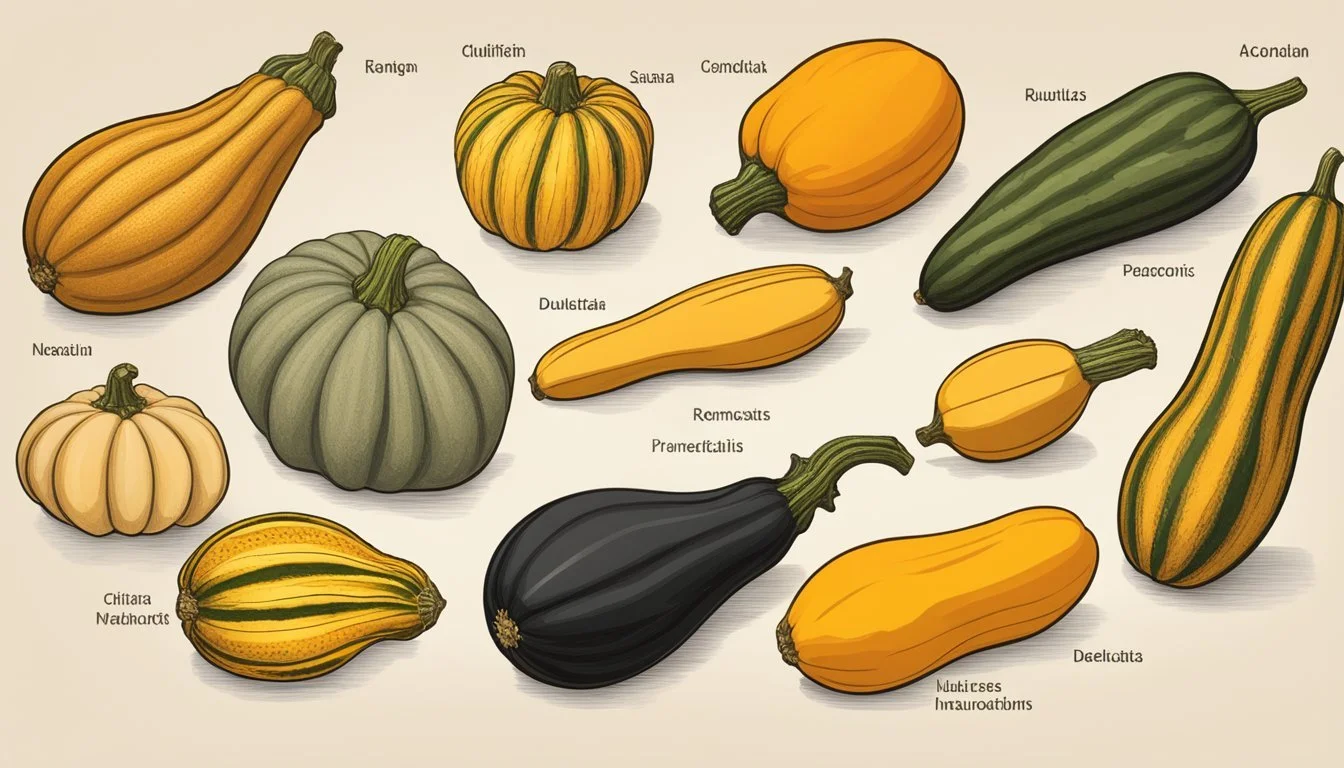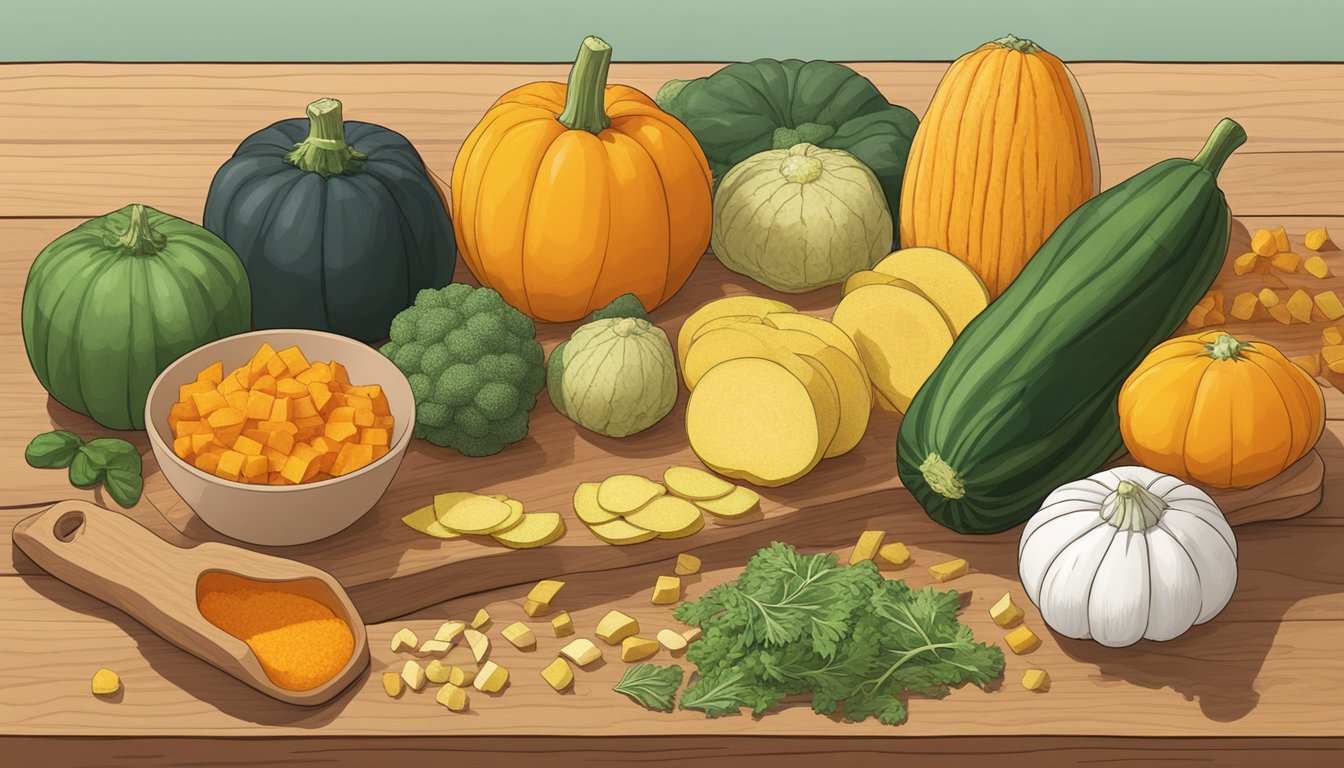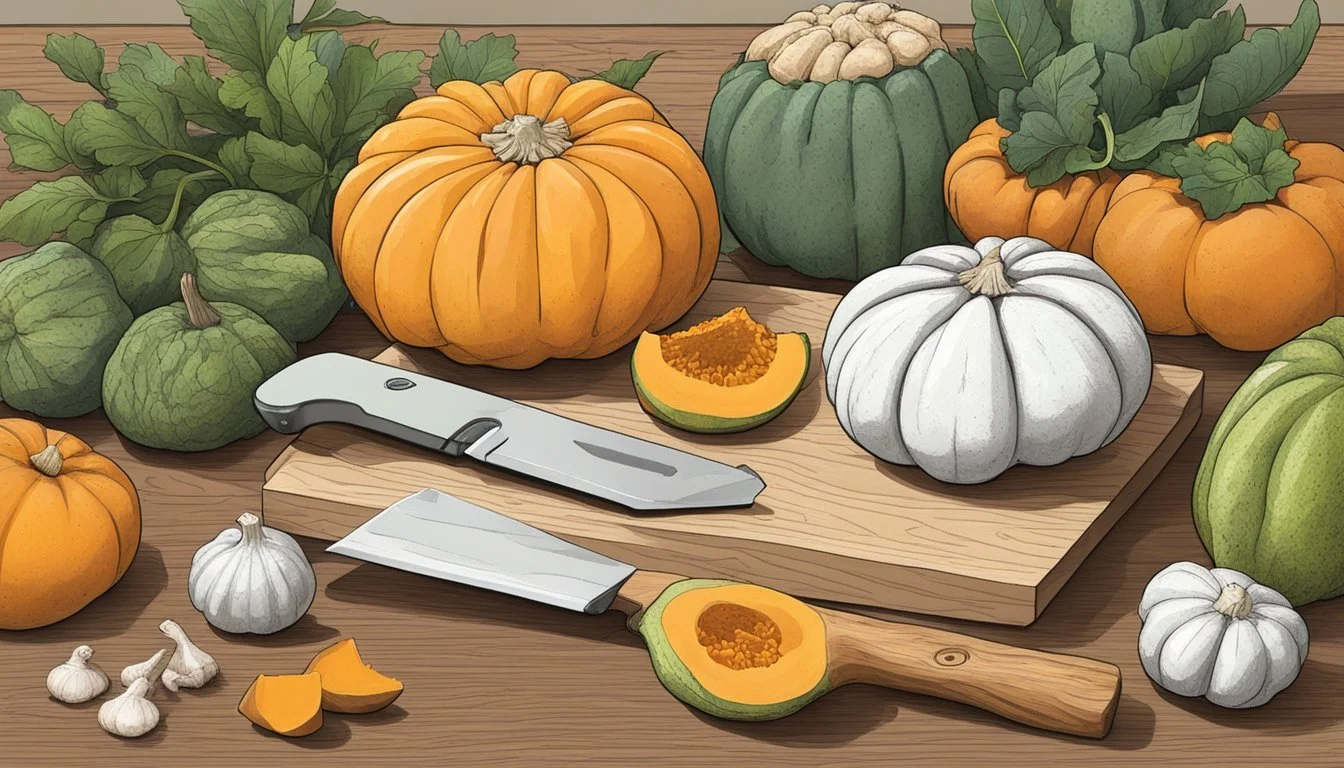Kabocha Squash Substitutes
Top Alternatives for Your Recipes
Kabocha squash, known for its sweet and nutty flavor, is a beloved ingredient in many kitchens. Its smooth texture makes it ideal for soups, stews, and roasted dishes. When kabocha squash is unavailable, there are several effective substitutes that can match its flavor and texture.
One excellent alternative is the butternut squash, which shares a similar sweetness and smooth texture. Sweet potatoes also serve as a viable substitute with their rich, sugary taste and comparable consistency. For those seeking a different twist, acorn squash offers a sweet and nutty flavor that closely resembles kabocha.
Another notable option is banana squash, prized for its creamy texture and golden flesh that enhances the visual appeal of recipes. Lastly, yam, with its starchy flesh, can also stand in for kabocha, although it has a slightly different texture. These substitutes ensure that recipes can be adapted without compromising on taste or quality.
Understanding Kabocha Squash
Kabocha squash, often referred to as Japanese pumpkin, is a popular ingredient known for its distinct flavor and versatile culinary uses. Its unique characteristics and nutritional benefits make it a favorite in various dishes such as soups, curries, and stir-fries.
Characteristics of Kabocha Squash
Kabocha squash is easily identifiable by its dark green rinds flecked with lighter green or white stripes. The squash is roughly the size of a small pumpkin and feels heavy for its size. When cut open, the flesh is a vibrant orange and has a dense texture.
The flavor profile resembles a mix between a sweet potato and a pumpkin, offering an earthy sweetness that pairs well with both savory and sweet recipes. This squash is known for its smooth, creamy texture when cooked, making it ideal for purees and soups.
Nutritional Profile
Kabocha squash is packed with nutrition. It is low in calories yet high in essential vitamins and minerals. A single cup of cooked kabocha squash provides:
Calories: Approximately 40 kcal
Vitamin A: About 70% of the daily recommended intake
Vitamin C: 15% of the daily value
Fiber: 2-3 grams
Additionally, it is a rich source of beta-carotene, which is beneficial for eye health. The squash is also low in carbohydrates, making it a suitable option for low-carb diets. Its high fiber content aids in digestion and contributes to a feeling of fullness.
Culinary Uses
In the kitchen, kabocha squash is incredibly versatile. It can be roasted, steamed, pureed, or added to various dishes. Its natural sweetness enhances the flavor of soups and curries, while its creamy texture works well in purees and as a thickening agent in stews.
For stir-fries, kabocha squash can be sliced thinly and quickly cooked with other vegetables and proteins. Its robust flavor stands up well to spices and seasonings, making it perfect for Asian-inspired recipes. Additionally, it can be baked or mashed similar to potatoes for a delicious side dish.
In summary, kabocha squash’s unique characteristics, impressive nutritional profile, and versatility in the kitchen make it a valuable ingredient in many culinary traditions.
Best Substitutes for Kabocha Squash
When kabocha squash is unavailable, there are several viable substitutes that capture its sweetness and texture. These alternatives can seamlessly integrate into various recipes, providing similar culinary benefits.
Butternut Squash and Its Benefits
Butternut squash is a common replacement for kabocha due to its remarkably similar texture and flavor. It possesses a sweet, nutty taste that melds well with both savory and sweet recipes. Butternut squash has a smooth skin, making it easier to peel.
Its flesh is creamy, which enhances soups, purees, and baked dishes. The squash is also rich in vitamins A and C, providing nutritional benefits akin to kabocha. Additionally, butternut squash is readily available and relatively easy to find year-round. This makes it a convenient go-to option for home cooks.
Key Points:
Sweet, nutty flavor
Smooth and creamy texture
High in vitamins A and C
Sweet Potatoes as an Alternative
Sweet potatoes offer a balanced mix of sweetness and starchiness that can mimic kabocha's qualities. Whether baked, roasted, or pureed, they add a robust flavor to myriad dishes. Their versatility extends to both sweet and savory recipes.
In terms of nutrition, sweet potatoes are a powerhouse of vitamins, minerals, and fiber. They are especially high in vitamin A, contributing to eye health. However, they are slightly sweeter and softer than kabocha, so adjustments in cooking methods may be necessary. Choosing firm sweet potatoes with unblemished skin ensures the best texture and flavor.
Key Points:
Balanced sweetness and starchiness
Versatile in many recipes
High in vitamins and fiber
Pumpkin: A Classic Replacement
Pumpkin is another effective substitute, particularly in recipes requiring a mild and slightly sweet flavor. Commonly used in pies and desserts, pumpkin works equally well in savory dishes like soups and stews. Its dense, smooth texture makes it an excellent stand-in for kabocha.
Sugar pumpkins, or pie pumpkins, are the best types for this swap. They provide a similar color and consistency, making them a visually and texturally appropriate choice. Pumpkins also offer a good dose of vitamins A and C, supporting overall health.
Key Points:
Mild, slightly sweet flavor
Dense, smooth texture
Suitable for sweet and savory dishes
Cooking Techniques for Substitutes
When using substitutes for kabocha squash, consider how their textures, flavors, and moisture contents will affect the final dish. Proper technique ensures successful substitution whether you're baking, making soups and curries, or roasting.
Adjustments in Baking
When baking with kabocha squash substitutes like sweet potatoes or pumpkins, adjustments may be needed due to varying moisture levels. For instance, pumpkin tends to be more watery, which might require slightly reducing other liquids in the recipe. Sweet potatoes, on the other hand, have a denser texture and similar sweetness; they can be used one-to-one in recipes designed for kabocha squash.
In desserts, aim for substitutes with similar sweetness and starch content. Sugar pumpkins are an excellent choice for pies and cakes. Use a combination of steaming or microwaving the substitute to achieve a tender texture before mashing it into batters or doughs.
Preparing for Soups and Curries
For soups and curries, both acorn squash and banana squash offer delightful substitutes. Acorn squash has a nutty and slightly sweet flavor similar to kabocha and provides a creamy texture once cooked. To prepare, remove the skin and dice the flesh before steaming or boiling.
Banana squash will give soups a creamy consistency. This squash can be sliced into large pieces, steamed, and later pureed into the soup. Its flesh tends to hold shape better than pumpkin, making it ideal for chunkier soups.
For curries, pick substitutes with a texture that holds up during longer cooking times. Yams can be a suitable alternative but expect a starchier, more potato-like texture. Peel and cube them before adding to your curry base.
Best Practices for Roasting
Roasting enhances the flavors of squash substitutes like pumpkin, acorn squash, and sweet potatoes. To ensure even cooking, cut the squash into uniform pieces. Toss with oil, salt, and preferred spices before spreading them out on a baking sheet in a single layer.
The skin of substitutes like acorn squash can be left on if edible and desired, adding a bit of texture to the dish. Banana squash may need more time to roast due to its size, so adjust cooking times accordingly—usually around 25-30 minutes at 400°F.
Monitor the last 5 minutes of roasting to avoid over-caramelization. For added sweetness, drizzle a touch of honey or maple syrup midway through roasting for a caramelized glaze.
Considerations When Choosing Substitutes
When selecting a substitute for kabocha squash, it's crucial to account for taste, texture, and nutritional profiles to ensure the desired outcome in recipes. Here are detailed insights to help make informed decisions:
Taste and Texture Comparisons
Pumpkin: Mild and slightly sweet, pumpkins have a dense and smooth texture. They can be substituted in equal amounts and are ideal for both savory and sweet recipes.
Sweet Potatoes: With a sweet flavor and creamy texture, sweet potatoes can replace kabocha squash at a 1:1 ratio. They are rich in vitamins A and C and offer substantial fiber.
Acorn Squash: Acorn squash delivers a nutty and sweet flavor with a tender, creamy texture. It pairs well with various recipes, adding richness and depth.
Yams: Though starchier and with a rough, inedible skin, yams offer a similar nutritional profile. They are not as sweet but serve as a reasonable stand-in for certain dishes.
Banana Squash: This substitute has a creamy texture and golden flesh, enhancing dish presentation. Its mild flavor makes it versatile for many recipes.
Alternative Squash Varieties
Kabocha squash isn't always available, but there are plenty of other squash varieties that can seamlessly replace it in recipes. This section covers some of the best alternatives and explains their unique properties.
Exploring Squash Diversity
Sugar pumpkins are excellent for their sweet and dense flesh, making them perfect for desserts and savory dishes alike. Acorn squash boasts a nutty and sweet flavor and a tender, creamy texture, which makes it a good contender in various recipes.
Pumpkins are mildly sweet with a smooth texture, often used in pies but versatile enough for savory dishes. Spaghetti squash offers a unique stringy flesh that's great for low-carb noodle substitutes, bringing a distinct texture to recipes.
Lesser-Known Yet Viable Options
Banana squash provides a creamy texture with a golden hue, enhancing both the appearance and flavor profile of dishes. Hubbard squash has a slightly sweet and hearty texture that holds up well in long-cooked dishes like stews and casseroles.
Yams may not be the first choice, but their starchy texture can be useful in certain recipes. While they differ somewhat in texture and flavor, they offer a viable option when other squashes are not available.
Summer squashes like zucchini can be an interesting alternative, though their water content is higher, which might affect the texture of the dish. They are more suitable for quick-cooking methods and fresh salads.
Non-Squash Vegetable Alternatives
When kabocha squash is unavailable, numerous non-squash vegetables provide excellent alternatives. Some excellent substitutes include root vegetables like sweet potatoes and yams, as well as plantains and other plant-based options.
Root Vegetables and Tubers
Sweet Potatoes: These are one of the most versatile substitutes for kabocha squash. Sweet potatoes have a natural sweetness and dense texture that mirrors the qualities of kabocha. They are rich in beta-carotene, fiber, and vitamins, making them a nutritious option.
Yams: Yams can be another substitute. These are starchier and less sweet than sweet potatoes, with rough, bark-like skin that isn't edible. They work well in stews and soups, offering a hearty and filling component to any dish.
Yuca: Also known as cassava, yuca is less common but worth considering. It has a mild flavor and a starchy, fibrous texture. Yuca is excellent in stews and fried dishes, providing a substantial, satisfying bite.
Fruits and Other Plant Substitutes
Plantains: They are versatile and offer a slightly sweet flavor when ripe, or a starchy, more potato-like texture when green. Fried plantains can be an interesting substitute in certain recipes needing a bit of sweetness.
Banana Squash: Although typically classified with squashes, banana squash can also be considered. It has creamy flesh and a subtle sweetness, making it a good stand-in for kabocha in both savory and sweet recipes.
Fruitier Flavor Options: For a more adventurous twist, ingredients like jackfruit or certain types of apples can be used. These options provide a fruitier flavor that can add an unexpected but delightful sweetness to dishes that usually call for kabocha.
Each of these substitutes brings unique textures and flavors, allowing for creative and delicious culinary experimentation.
Personal and Professional Insights
Substituting kabocha squash can be simple and rewarding. Expert opinions and user experiences highlight various alternatives that still deliver excellent flavor and texture.
Expert Opinions on Substitutes
Personal chefs and catering professionals often recommend butternut squash as the top substitute for kabocha squash. Its sweet, nutty flavor and smooth texture make it a versatile choice for soups, stews, and roasted dishes. For a similar sweetness profile, acorn squash and sweet potatoes are also favored. These alternatives are not just effective but also widely accessible in markets, which simplifies meal preparation. Food writers, through extensive testing, affirm that adjusting the quantities to match the recipe's requirements is key to achieving the desired results.
User Experiences and Reviews
Users often share their positive experiences with kabocha squash substitutes on cooking forums and review sites. Butternut squash receives high praise for its comparable sweetness and versatility in various dishes. Sweet potatoes are another favorite, noted for their ease of use and slightly earthy flavor that complements many recipes. Sugar pumpkins cater especially well to desserts, thanks to their higher sweetness. Numerous reviews indicate that these substitutes don't compromise the taste or texture of the finished dish, making them reliable options for home cooks and restaurant chefs alike.
Purchasing and Storing Substitutes
Selecting the right substitute and proper storage are crucial to maintain flavor and texture. Knowing how to choose and store alternatives like acorn squash, sweet potatoes, and banana squash ensures they remain fresh and suitable for various recipes.
Selecting the Right Substitute
When purchasing acorn squash, look for ones with a dark green skin. The rind should be firm and without soft spots. It should feel heavy for its size, indicating it's full of moisture.
For sweet potatoes, select ones with a smooth, unblemished skin and no sprouts. They should be firm and feel heavy, signifying they are fresh.
Choosing a banana squash involves looking for a firm, unwrinkled skin. Pick those that are heavy for their size, as this indicates moisture content and freshness.
Storage Tips for Longevity
Store acorn squash in a cool, dry place. Avoid exposing them to direct sunlight or moist environments to prevent decay. They typically last for a month when stored properly.
Sweet potatoes should be kept in a cool, dark place, ideally in a pantry. Avoid refrigerating them as it can alter their flavor and texture. Stored correctly, they can last up to a few weeks.
Banana squash also prefers a cool, dry spot. Ensure that the storage area is not too humid and that the squashes do not touch each other. They can last several weeks if stored under the right conditions.









